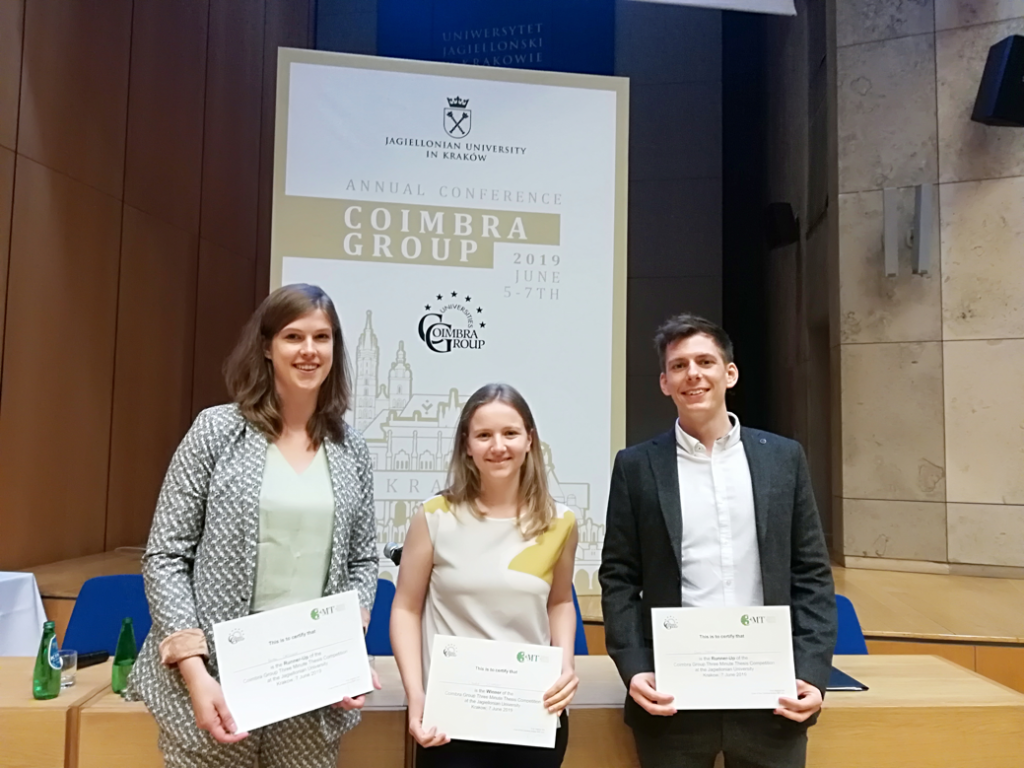CG 3MT Winner on her experience with communicating her research to a lay audience
03 February 2020
Since 2017, the Coimbra Group has been running a Three-Minute Thesis (3MT) competition, following the model developed by the University of Queensland, Australia. This competition is geared towards doctoral candidates and consists in explaining one’s own research in three minutes, in a language appropriate to a non-specialist audience.
The winner of the 2019 edition of the Coimbra Group Three-Minute Thesis (3MT) competition, Claudia Schmidt, shares with us her reflections on her experience with preparing and training for the competition. Claudia is based at the University of Göttingen, where she is carrying out research is in the field of molecular miology and biochemistry, in particular biochemistry of membrane proteins. Her task as one of the three finalists back on 7 June at the live Coimbra Group 3MT final at the Jagiellonian University in Krakow, was to explain to our audience how our cells recycle. A task she accomplished brilliantly, in three minutes and with one slide.
This article was originally published in the Molecular Biology newsletter of the University of Göttingen.
To present my PhD at the Three-Minute-Thesis Competition in Krakow
As scientists, we regularly discuss our experiments with our colleagues and present our results at seminars and conferences. We are (more or less) familiar with the background of our audience and know how to introduce our specific topic. But when our relatives ask us at the big family dinner, what we work on, we often struggle to find the right words to explain our research. I realized that I needed to work on my communication skills so that I can finally talk about my work in an understandable way to people outside the “biology bubble”. When a friend showed me the call for a three-minute thesis (3MT) competition, I got excited. Why three minutes? The competition is structured as follows. Presenters have a time frame of three minutes to explain their research to a non-specialist audience. Originally introduced by the University of Queensland, such a competition is carried out each year by the Coimbra Group, an association of European universities. After initial competitions at each member university (including the University of Göttingen), a video of each winner’s talk enters a Coimbra Group-wide competition from which three contestants are selected for the final.
Last year in January, I sat down to prepare my talk. How should I break down my PhD project on “Reconstitution of Doa10-mediated ER-associated protein degradation with purified components”? I soon came to realize that a lot of fancy terms such as “proteins” are not necessary to understand the essence of my project. Luckily, I prepared the talk together with a friend. This helped a lot to find and eliminate these complicated words and phrases. Moreover, I used metaphors to convey concepts. And by this method, I replaced my favorite protein Doa10, the proteasome and ER-associated protein degradation with the trash collector, the trash can and recycling in the cell. To keep the audience interested, I tried to narrate a story of my discoveries. When I finally had a story written down, I had to prepare my talk. The good thing about a three-minute talk is that you can practice wherever and whenever – so I got creative and my toothbrush as well as probably a lot of random people on the bus now know what I am working on.
The competition in Göttingen was a very interdisciplinary event. PhD students from disciplines such as biology, mathematics, agriculture, and history came together. Luckily, as the talks were prepared for a non-specialist audience, I was able to follow the presentations. I managed to win the competition in Göttingen and was super excited when I got the email that I was selected to travel to the final in Krakow where the annual meeting of the Coimbra Group took place last year. Owen James (University of Edinburgh), Femke Cnossen (University of Groningen) and I presented our PhD projects with topics ranging from Neurobiology to Economics. I was very surprised and happy to win the first prize! Afterwards, Femke, Owen and I enjoyed our stay in the beautiful city of Krakow where we ended the day with dinner in a traditional polish restaurant. And so, I not only received a prize but also met two amazing PhD students from such different fields that sharing our experiences was refreshing and fun. This made the trip absolutely memorable.
Despite having to deal with quite some nervosity, I really enjoyed presenting my PhD in three minutes. A scientific presentation usually contains a lot of detail. This talk was totally different. I tried to zoom out as much as possible to be able to deliver a bigger picture – being used to the opposite, this was quite a difficult but extremely fun task. Moreover, only one slide was allowed. I noticed that this has a big advantage on stage. I was able to give my full attention to the audience without any distractions. I had time to look at people, look at their expressions and how they react to my story. All in all, this 3MT competition taught me a lot. Especially, that talking about your research to people outside your bubble, zooming out of the details and getting connected with scientists from all disciplines can really motivate you to pursue your research.



